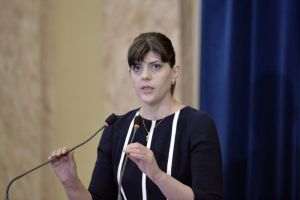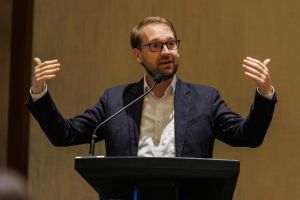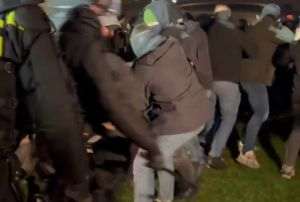Radu Soviani: Mr. Coşea, 30 years since the onset of mass privatization, how do you perceive this phenomenon and set of actions?
Mircea Coşea: Still unknown. When we started working on this issue immediately after 1990, the atmosphere was entirely different. We were working under the influence of, in quotes, advice from economists who had no idea what it was all about. Jeffrey Sachs had no experience with what we call the transition; he worked in South America. He proposed about five elements that needed to be solved urgently, including a free market, currency..., and privatization. Romania was one of the most backward countries in terms of the process because, at the time of transition, it had not had a significant private sector. Almost none. And we had something else. I have said it several times; I am not someone to hide certain things. I had a very complicated period with President Iliescu, who was not a supporter of changes, regarding Mr. Bîrlădeanu, a man who had some revolutionary ideas around 1960 regarding socialism - now he was in a period when the transition to a new form of organization, not called transition, the organization of the economy, they believed that managers needed to be changed, to be better prepared, and things would go well from now on, nothing else needed to be done.
Radu Soviani: Bîrlădeanu being the President of the Senate at that time...
Mircea Coşea: The President of the Senate and a man who had a great influence on Mr. Iliescu in terms of economic thinking. He was a good economist but shaped, naturally, in the planned vision of the economy. However, he had some revolutionary ideas in 1960 about the spring of Prague when he believed that managers needed to be changed, to be better prepared, and things would go well from now on; nothing else needed to be done.
Radu Soviani: Bîrlădeanu being the President of the Senate at that time...
Mircea Coşea: The President of the Senate and a man who had a great influence on Mr. Iliescu in terms of economic thinking. He was a good economist but shaped, naturally, in the planned vision of the economy. However, he had some revolutionary ideas in 1960 about the spring of Prague when he believed that managers needed to be changed, to be better prepared, and things would go well from now on; nothing else needed to be done.
Radu Soviani: How did we end up with vouchers, Mr. Coşea?
Mircea Coşea: That was a very important issue in Romania. Because Romania was the only country, perhaps Bulgaria had something similar, that had no ideas and education about what the capital market meant. So, what I dealt with in the government was not privatization. I dealt with the capital market. There were discussions with some participants, quite well-known, who had various ideas, such as Adrian Severin, Mişu Negriţoiu, those from Eximbank. Ultimately, a decision was made, and an important role here was played by Academician Postolache, to go with the idea that the Poles had previously had, namely to issue vouchers. Vouchers meant a certain distribution, in quotes, of ownership to a certain part of the population, namely the population over 18 years old. They were supposed to be redeemed through certain centers and bring benefits later depending on how the companies performed. It wasn't an idea that everyone understood. Some trivialized it; terms like "cupoaneada" appeared because, during Ceauşescu's time, there were artistic celebrations that ended in ADA. But this idea undoubtedly led to the formation of the capital market because shares appeared. There was a period of several years when shares were traded, and shares began to exist on the stock exchange and go up. Still, the process was blocked because there were some situations that we, who worked in this field, did not know. We were not politicians. We were technicians working in the system. We didn't actually know what was happening with the banks in Romania. We didn't know how tempting they were for some to take them over entirely. So, this process, this "cupoaneada," this transition to shares had to end; it was necessary to have two banks that would operate. Emphasis was placed on Banca Agricolă and Eximbank.
Radu Soviani: Banca Agricolă almost went bankrupt.
Mircea Coşea: In April 1995, the proposal we made on behalf of the Reform Council was blocked by the ruling party. In Parliament, it was blocked, even condemned - how dare you touch these two banks that were later looted? You know very well how. So the process remained stagnant, on one side. Attempts were made to do something, to correct with RASDAQ. And here, we did what we could. However, the introduction of this system came much later because, after 1996, privatization was carried out during the government at the time in the form of sales.
Radu Soviani: 70% State Ownership Fund (FPS), 30% private property funds, the future Investment Funds (SIFs)...
Mircea Coşea: So the idea I had for this privatization to take place on the stock exchange - we had Polish, Japanese, American consultancy, things were known - it could be done. Some young people were prepared for this, especially people like Mr. Farmache, but the process was blocked during Mr. Ciorbea's government because privatizations started happening in a form that those of us outside the system neither understood nor knew. We don't know what happened.
Radu Soviani: I have the data from the central depository here - initially 18.75 million shareholders, now there are over 8.3 million shareholders resulting from the mass privatization process who have no idea they own shares and do not exercise their rights. What do you think of this situation in 2021 and 2022?
Mircea Coşea: That's exactly what I wanted to tell you. It took many years for it to go somewhere, and by eliminating some substantive elements that should have led to Romania's transformation into a country with an active capital market, we returned to a form where privatization was very much, especially after 97-98, politically governed. Some, let's use a trendy term, Romanian oligarchs, mini-Romanian oligarchs, started to appear, who had money from somewhere, we still don't know from where, maybe from some ownerless briefcases that were left behind, who took information and had support because many people from the previous system had entered important positions in state institutions, especially in banks. So the process started to be transformed into a kind of continuation of activity at minimum limits. The stock exchange functioned minimally; it had some better moments - even now, in my opinion, it is not a great success, but privatizations that took place after this date were guided by two central elements. Firstly, by a list made in Mr. Oliviu Gherman's cabinet, together with Mr. Dima from FPS and a representative of the SRI - sometimes it was Mr. Măgureanu, sometimes someone else, who, from the list of companies, said which are strategic and which are not. The term was very general. What does strategic mean? For example, there was a very important discussion about whether the refrigerator factory in Găeşti was strategic or not. Because there were some interests.
Radu Soviani: Had Mr. Măgureanu reached the point of deciding which company should be privatized and which should not?
Mircea Coşea: Yes, it was a discussion that took place every Monday morning in Mr. Gherman's office. At that time, Mr. Gherman's office was in the current headquarters of the Ministry of Internal Affairs. From the Reform Council, only Mrs. Hildegard Puwak participated; I was never invited to these discussions, and the list of privatizations was made. This doesn't mean they were privatized. It was just an idea. It took a very long time.
Radu Soviani: I remember, for example, Aro was considered a strategic enterprise until Virgil Măgureanu decided to take it over...
Mircea Coşea: Yes. These are things that need to be said in the end because, you see, there are some characters in this Romanian transition who played a very important role in economic processes, without actually being economists or included, but they had political strength, support from some state institutions that had an important role at the time, were things that were said, and here the credit goes to Prime Minister Văcăroiu, who often insisted on changing things, but at least from what I saw, they often did not change. For example, the SRI had to report weekly on what was happening with privatization. However, the Government received some reports like "it rained, it didn't rain," nothing serious, probably because we were not considered people who knew exactly what was happening.
Radu Soviani: Or you were causing trouble...
Mircea Coşea: Yes. One thing is certain; it was an extraordinary effort. There was another gentleman, Mr. Zelenco, who had exceptional merits - he worked very hard. However, all these people who worked at that time and contributed to reaching a certain point, in the next political cycle, none of them reappeared. They were all rejected. None of them became ministers, deputies, or anything.
Radu Soviani: So, weekly lists were made for privatizations, and on the SIF side, we had reached the point where 30% of the economy ended up in whose hands? Who was leading the SIFs then, who leads them now, after 30 years?
Mircea Coşea: The SIFs were led by people who seemed to come out of nowhere. You didn't know who they were, but they had a great influence and had free access everywhere. Not at the government level, but at the level of the Presidency and Parliament.
Radu Soviani: 30% of the economy...
Mircea Coşea: Very rarely were there correct information and direct discussions with the government about the SIFs. Probably there were some briefings at the level of the prime minister who was very interested in respecting a certain... This must be said about Mr. Văcăroiu. Mr. Văcăroiu was an extremely honest prime minister. He had a certain vision of the economy, which is not to be condemned, but he never accepted things that could be considered criminal or immoral. But I'm sure he didn't know many things. They were not known. They were not even determined at the government level but at the level of the then PSD (Social Democratic Party) and the SRI (Romanian Intelligence Service). The SRI had a very important place in this whole process because there was the strong personality of Mr. Măgureanu, who intervened everywhere. He was a man with a strong personality, practically everywhere. Like the gas. Wherever he found an empty space, he occupied it. That's what gas does. But when we entered a period in which a certain vision of the process had to be made, and I'm referring to the period when Mugur Isărescu became prime minister, it was seen that there were two major flaws in the process: we were losing Romanian capital, especially in the banking sector, and on the other hand, there was a total lack of attention from those dealing with privatization regarding the creditworthiness of those who wanted to privatize. Individuals came, as was the case with ARO, which you mentioned. A certain individual who said he was doing something, in the end, did nothing. They were nobodies, actually. Probably, they had some political support or simply group support. They were in groups that took advantage of certain elements that had to be put in place. The second flaw that appeared was that we did not have a correct policy regarding attracting foreign capital. Foreign capital had to come to Romania, and documents were made at the Reform Council based on some priorities we wanted. For example, these priorities at that time were on two important areas: the agricultural machinery industry and the old and classic problem, infrastructure. Even though there was such a concern at that time, later it disappeared because of that troubled period with the Democratic Convention in which things did not settle politically at all. After that, some governments came that can be praised for the growth rates they achieved, but they did not advance at all in terms of changing the structure of the Romanian economy, and today, in my opinion, as a result of not knowing how to set priority criteria for foreign capital, we have an economy left behind, a manufacturing, energy-intensive economy that cannot cope, being different from what happened in Poland, where the attraction of capital was on branches and areas that the Government determined through a strategy. Coming here, we must say that we did not have a strategy, and we still don't.
Radu Soviani: It was the time of the million and the coupon. 25,000 lei were on coupons, 975,000 lei on privatization certificates. One million old lei, 100 lei now. In your opinion, if those who put money into SIFs in the economy had managed correctly how much the hundred lei from 1995 should have been worth now, in 2022?
Mircea Coşea: A calculation was made, you will be surprised. A calculation was made with the information we had at that time. And it should have been five times higher in the year 2000.
Radu Soviani: So, by the year 2000, it should have already been five times higher...
Mircea Coşea: Yes, after that, it was no longer done.
Radu Soviani: According to a study by the Association of SIF Investors, it appears that 100 lei from 1995 were worth in 2020 - 820 lei, adjusted for inflation, 3300% inflation during this period, 24 lei. 100 lei turned into 24 lei during this period. What do you think?
Mircea Coşea: I don't trust those who oversee the capital market.
Radu Soviani: I'll show you some images from 1996, even with you. (Audio statements from Mircea Coşea in 1996: "The world, or a certain part of the press, or a certain part of the political parties see privatization as a kind of accomplishment of the miners' plan. You know, over 101%. No! Subscription must reach a percentage at which the capital market can function. A number of shares are needed to trigger the market.") The subscription figure was exceeded, but later, over seven million shareholders remained who never used their shares.
Mircea Coşea: They didn't use them because they didn't even know what it was about. On the other hand, the income was very low; some were not even interested. All these things, you see, now, after so many years, show, on the one hand, the lack of experience of those who worked then, mine and others, because we started from scratch, we knew nothing about what would happen. On the other hand, there was a great trust that what we were doing was understood and appreciated by everyone. In fact, it was not understood.
Radu Soviani: After which it short-circuited...
Mircea Coşea: It short-circuited when we couldn't privatize the two banks that were supposed to run these, it short-circuited, and we reached the point of selling, I wrote a lot at that time, almost off the shelf. I don't even know exactly the privatization files, and until today, we don't have them, I don't know, I didn't have access to any of them. What was done, how it was done, with whom, in what terms, because various ideas circulated - sell for a dollar, for example. Mr. Agathon, who was at the Ministry of Tourism, wanted to privatize in this way - we give one leu, but the benefit next year. There were all sorts of ideas circulating that were sometimes better received by the population than this process that had to go step by step to create a capital market, in which Romania would become a country that could have the stock exchange as development tools. I'm not convinced that the stock exchange currently plays any role in Romania's development.
Radu Soviani: Why not? Oversight, those who control the capital market?
Mircea Coşea: I'll tell you something that I should probably abstain from. I don't trust those who oversee the capital market.
Radu Soviani: Do you know anyone who trusts them?
Mircea Coşea: There might be, I don't know. I don't have information, but seeing what's happening, I realize that I have no reason to trust because things are visible, tolerated, or directed. When there is a scandal, someone from public management writes a magnificent article with an economic theory about how good it is to have a capital market, and that's it, nothing else. Institutions that should cooperate in this direction, in regulating the market, such as the Competition Council, I don't know what they are doing. You see, we entered a system where functioning no longer matters to anyone. Only the image someone creates of what it is matters. We in Romania, now, work with images. We create images of what should be, of what you do, but behind the images is NOTHING.
Radu Soviani: Mr. Coşea, you called those who managed to cheat in the privatization process mini-oligarchs, with 70% sold by the FPS, to some of them. On the other hand, those who still control, a few, what represented 30% of the economy in the past, SIFs, which are under the eyes of the supervision you mentioned, how would you call them when seven million shareholders do not dictate management?
Mircea Coşea: You see, these are individuals, I don't know all of them personally.
Radu Soviani: There is Bogdan Drăgoi, at SIF1, the son of Dan Drăgoi...
Mircea Coşea: They are opportunists, profiteers, who, under the umbrella of a very extensive and challenging process, such as the capital market and privatization, pursued some interests, followed some careers. At some point, their path became very clear; after they were satisfied with what they had, they disappeared, you don't know where they are, you can't catch them to ask what they did. Think that there are important political figures who have been ministers of transport, who have done nothing, but who have created their own companies. No one knows about them anymore. There are other characters who have managed to get rich just because they didn't smoke and didn't drink beer. They saved. This world, of that period, was wild, and those who had to put their finger on the wound did not, it suited them. It is very clear that Mr. Iliescu's presidency was a presidency in which he was afraid of everything, afraid of mini-oligarchs, afraid of being condemned as pro-Russian, afraid that someone would scream that he didn't know what he did ten years ago. So, all these things led to a situation where the population, in the end, living better according to statistics, didn't pay much attention to these things. If you ask someone today if it's good to invest their money in stocks, they don't even know what it's about.
Radu Soviani: There are less than 100,000 active investors, considering there are 8 million shareholders.
Mircea Coşea: You see, we have ministers now advising people to protect themselves from the crisis by playing the stock market. It's like telling someone to go and scuba dive in the Red Sea, and that poor guy is 80 years old and suffers from asthma. This process was viewed in a form as much as possible, I don't even know how to say it, that it was not a slogan. Work was done; we have a stock exchange, we have stocks, but not as much as needed and not as it should be. The population is not included in this process.
Radu Soviani: Yet the active, dormant, or semi-active population ends up paying one million euros per year, clean money, to a president of one of the SIFs from their wealth. How does this amount sound to you now? One million euros...
Mircea Coşea: Any comment is superfluous here. You see, we now judge incomes based on the budget. This one earns 5000 lei per month, but he's a public servant. That one earns 50,000 euros per month, oh, but he's not from the budget... He doesn't steal from the budget. Where do the funds come from? From which economy? Isn't it all from that? The Romanian state is a state that cannibalizes its economy. It is interested in having benefits even if the economy dies. For example, the price of energy and bills is evident. What does the Romanian state mean, after all? Some institutions. Who are in those institutions? Perhaps 1% specialists, 99% politicians of different degrees and different levels of loyalty to their political bosses. And then we wonder if the processes were well thought out or not? They were politicized 100%. And most, I, now, for example, realize that I was manipulated.
Radu Soviani: How so?
Mircea Coşea: I even believed that things would go well and that we needed to be a country that has everything that capitalism has - a capital market, privatization. In fact, an environment was created where those who considered the budget as a means of enrichment, that's where the money comes from, benefited. The Romanian state feeds the budget in every way, sacrificing the population because it has to give money to those who form the state today. In times of crisis, there are no solutions. Because the solution should be a total restructuring of politics in Romania, which will not happen, and then we will be satisfied that we will gradually live better. If today you buy a chocolate bar, and in two days you buy two, you will say: wow, what progress I made! But the French don't even eat anything but organic chocolate. So, the gaps are constantly increasing. But they are needed. In the modern world, gaps are needed. Romania should never be a country above the middle rank of Europe because then certain benefits are lost on the system of communicating vessels. It must remain where it is, and so it will remain if the political class is just as obedient. But even if it is not, as in Poland, it still remains there. Because that is the development model until it is revolutionized. At the moment, what is happening with the invasion of Ukraine is an attempt to change the model. But not based on economic grounds. On political and military blackmail. So, personally, I don't hope it will be better in the next 50 years. I don't hope that the world will enter that almost, I don't even know how to call it, gallant idea at some point, of the universal state where all contradictions disappear, and the world lives in perfect harmony. No, that won't happen, and those who know how to use their opportunities will take advantage.
Radu Soviani: Almost 20 years ago, you told me in a show about Romania, a captured state. It became fashionable in 2021, if I'm not mistaken, this expression launched by you 20 years ago. You now say that you were manipulated in the privatization process. Who captured the privatization process? Who manipulated the privatization process?
Mircea Coşea: The privatization process was manipulated by certain external interests through our mini-oligarchs. You see, Romania, in fact, all the countries that entered Europe after 2005-2007, were considered as waste bins for Western production and capital. Some resisted, did not let themselves be carried away by the wave. Romania did not resist. So, without blaming anyone, no, I am not a supporter of capitalist exploitation, colonialism, or I don't know what else. The expansion of capital into areas where valorization is better is normal in a market. And here there is competition. If you can be competitive, competitive, then you will manage. If not, you won't. So it's normal that the Romanian market was freed from what distribution means for the big distribution companies to come. They sought this. It's normal not to have tractor factories anymore when there were huge stocks of tractors in factories in Germany and the Netherlands. If you don't have your own reaction to this, that's how you go.
Radu Soviani: We see, that was the primitive accumulation of capital, interests, mini-oligarchs. But I go back to the SIFs. In 2017, heads of SIFs were convicted for looting the wealth of the seven million shareholders. Convicted, with suspended sentences. In 2020-2021, we see the same things. What do we learn?
Mircea Coşea: We learn - if we want to learn, but we don't want to learn - that we don't change the rules of the game. We only change those who play.
Radu Soviani: Thank you very much!




























































